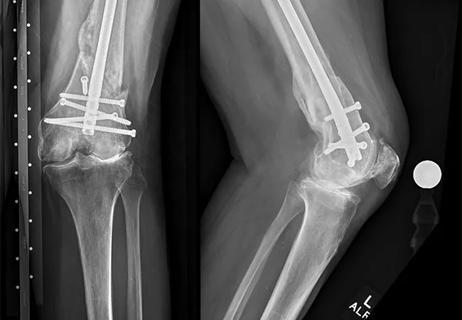Study findings warrant caution in patients at risk for DVT, cardiovascular issues and more

Despite the legality of medical cannabis for adults in 38 states — as well as nearly one in five Americans using some form of cannabis in 2021 — there is a lack of data regarding its effects on orthopaedic patients.
Advertisement
Cleveland Clinic is a non-profit academic medical center. Advertising on our site helps support our mission. We do not endorse non-Cleveland Clinic products or services. Policy
“Our vision is to provide evidence-based orthopaedic surgery, so we need to be able to generate data to inform every decision we make,” says Nicolas S. Piuzzi, MD, Director of Cleveland Clinic Adult Reconstruction Research. “However, as patients have increasingly reported cannabis use, we haven’t had enough data to be able to counsel them one way or the other.”
This dearth of research was the inspiration for a meta-analysis by Dr. Piuzzi and other Cleveland Clinic researchers published in The Journal of Arthroplasty. Using 19 studies published between 2012 and 2022, the analysis evaluated the effects of cannabis use on surgical complications, pain scores and opioid consumption, and healthcare utilization following total joint arthroplasty (TJA).
This study is among the first to examine the association of cannabis use and outcomes of TJA, according to Dr. Piuzzi.
Researchers reported an association between cannabis use and increased risk of certain complications after TJA, including:
“We don’t know if it’s because of the direct effect of cannabis or if it’s an association of other factors,” says Dr. Piuzzi.
The study also showed that cannabis use did not change pain scores or opioid consumption in either total hip arthroplasty (THA) or total knee arthroplasty (TKA).
“I had expected that a patient using cannabis would have lower opioid use and better pain scores, but according to the published data we had available, that was not the case,” says Dr. Piuzzi.
Advertisement
There also was no association between cannabis use and healthcare costs in THA. It was, however, associated with higher costs in TKA.
There was no difference found in length of stay after total joint surgery for cannabis users versus nonusers and no significant differences between the two in functional outcomes.
Dr. Piuzzi believes the complications reported in this study should be included in discussion and shared decision-making when patients report cannabis use. This is especially crucial for patients who have other risk factors for DVT, revision surgery, pneumonia, cerebrovascular accidents and cardiac complications.
“Cannabis use is potentially a modifiable factor,” he says. “At this point, the best we can do is be aware, counsel patients and look more carefully at patients’ other risk factors.”
One of the main limitations of this meta-analysis is that the studies included did not indicate how much cannabis was being consumed and whether it was for medical or recreational purposes. Higher quality studies with more granularity are needed to determine if some doses or intake methods are safer than others, or if cannabis can be beneficial.
“When you pull all the data, this is the highest level of evidence that we have available in our field to guide our practices,” says Dr. Piuzzi. “We want to impact medical care for the benefit of all patients, but if this research helps only one patient go through total joint replacement more safely, then it was worth the effort.”
Advertisement
Advertisement

Self-care may be just as effective for some patients

Most return to the same sport at the same level of intensity

More report a clinically meaningful change in function at 90 days compared to patients with lower BMI

How to diagnose and treat crystalline arthropathy after knee replacement

Special glasses allowed surgeon to see 3D models and anatomic data superimposed on surgical field

When procedure is performed by high-volume surgeons, outcomes are comparable to total knee replacement

Robot assistance turns two-stage surgery into a single procedure

Robot scores better in length of stay and home discharge; manual scores better in flexion and operative time